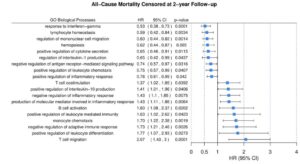Publication: Multimarker profiling identifies protective and harmful immune processes in heart failure
“Not all immune processes in HF are harmful, some do have protective effects”, this is the main message of the study published by George Markousis-Mavrogenis and colleagues in Cardiovascular Research. The study emphasizes the redundancies and the complexity of the immune response in the context of heart failure and provides evidence for potential future targets using a bioinformatics approach.
Clinical trials that previously investigated immunomodulatory interventions in patients with heart failure are limited and focused mainly on TNF-α. Therefore, defining new potential targets and improving the characterization of the immune response in heart failure is needed. Based on different functional groupings of 188 circulating biomarkers measured in 2022 patients with worsening heart failure (BIOSTAT-CHF cohort) and 1691 patients of the independent BIOSTAT-CHF validation cohort, 64 distinct immune-related processes were identified and studied for their relationship to all-cause mortality at 2-year follow-up.
After generating a weighted score for each of these processes using principal component analysis, 19 immune-related processes were associated with all-cause mortality (10 positively and 9 negatively). After external validation, increased activation of ‘T-cell costimulation’ and ‘response to interferon-gamma/positive regulation of interferon-gamma production’ showed the most consistent positive (i.e. harmful) and negative (i.e. protective) associations with all-cause mortality, respectively. The authors provided a rich knowledge based that forms an excellent source for future research of immune activation in the context of heart failure. Additionally, the authors suggested several potential therapeutic targets, including enhancing IFN-gamma production and blockade of ICOSLG, CD28, CD70, and TNFSF14.

You can read the full open-access article by clicking here.